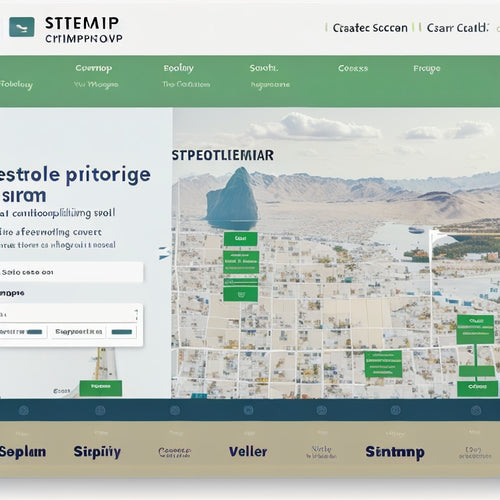
E-Commerce Booms: Retailers Expect Growth in 2017
Share
Retail professionals are overwhelmingly optimistic about the outlook for e-commerce in 2017, with 94% anticipating business expansion in the first quarter alone. Expected improvements in online revenue, site conversion, mobile transactions, and site traffic are driving this confidence. Specifically, 80% expect increased online revenues and profits, and 71% predict a boost in site conversion rates. As e-commerce continues to evolve, understanding the key performance metrics, consumer behavior trends, and retailer initiatives will be essential for staying competitive. The future of e-commerce holds much promise, and a closer look at the data reveals even more insights into this growing industry.
Key Takeaways
• 94% of retail professionals anticipate business expansion in Q1 2017, driven by expected improvements in online revenue, site conversion, and site traffic.
• 80% of retailers expect increased online revenues and profits in Q1, with 71% predicting a boost in site conversion rates.
• Mobile transactions are expected to increase by 73%, as retailers focus on mobilizing their online presence and enhancing customer experience.
• Despite concerns over international trade, retailers remain optimistic about the new administration's impact, with positive expectations on corporate tax implications.
• Top growth initiatives for retailers include improving customer experience, optimizing inventory, and logistics, with 76% expecting a decrease or no change in fulfillment costs per order.
E-Commerce Growth and Confidence
As the e-commerce landscape continues to evolve, a resounding 94% of retail professionals anticipate business expansion in Q1, backed by a positive forecast for 2017, with expected improvements in online revenue, site conversion, mobile transactions, and site traffic.
This optimism is fueled by the majority (80%) expecting increased online revenues and profits, while 71% predict a boost in site conversion rates.
These projections are not unfounded, as the EPIC Report respondents, comprising various retail business models and managerial positions, have a pulse on the industry's pulse.
With online revenue and site conversion being key areas of focus, retailers are poised to capitalize on the growth opportunities in 2017.
Key Performance Metrics Expected
Retailers are poised to drive growth in Q1 2017, with expected improvements in key performance metrics such as site conversion, average order value, cart abandonment rates, and bounce rates, underscoring their confidence in their online strategies. To achieve this, retailers are focusing on site optimization, with top initiatives including customer experience, inventory, logistics, and mobile site enhancements.
Here are some key expectations:
- 71% expect an increase in site conversion rate
- 76% foresee a decrease or no change in fulfillment costs per order
- Mobile transactions are expected to increase by 73%
- 80% of respondents anticipate increased online revenues and profits in Q1
Impact of the New Administration
Many e-commerce professionals believe the new U.S. administration will have a significant impact on their businesses, with varying expectations on how it will affect different aspects of retail operations.
When it comes to international trade, retailers are bracing for a negative impact, citing concerns over tariffs and trade agreements. On the other hand, they expect a positive effect on corporate tax implications, which could lead to increased investments in their businesses.
Surprisingly, UK respondents are more pessimistic about the administration's impact on online businesses. While opinions are divided, one thing is clear: the new administration's policies will have far-reaching consequences for e-commerce businesses, and retailers must be prepared to adapt to the changing landscape.
Consumer Behavior and Trends
SLI Systems' analysis of consumer behavior, derived from over 600 leading retail websites globally, reveals that shoppers are increasingly using fewer words in site searches, indicating a desire for efficient and relevant online experiences. This shift towards concise search queries highlights the importance of retailers providing intuitive and accurate search functionality to meet evolving shopper expectations.
Some key shopper insights include:
-
69% of shoppers use site search to find specific products.
-
55% of shoppers will leave a site if they can't find what they're looking for.
-
41% of shoppers use site search to discover new products.
- 35% of shoppers will return to a site with a good search experience.
Retailer Optimism and Initiatives
As e-commerce professionals express confidence in their business expansion plans, a closer look at their key performance metrics and strategic initiatives reveals a collective focus on enhancing customer experience, optimizing inventory and logistics, and mobilizing their online presence.
Retailers are adopting optimistic strategies, with 80% anticipating increased online revenues and profits in Q1. Top growth initiatives include improving customer experience, inventory, and logistics, as well as mobile site enhancements. Importantly, 76% of respondents expect a decrease or no change in fulfillment costs per order.
These initiatives demonstrate retailers' commitment to driving growth and staying competitive in the e-commerce landscape. By focusing on these key areas, retailers can capitalize on the expected boom in e-commerce and stay ahead of the curve.
Frequently Asked Questions
How Do Retailers Plan to Address the Growing Threat of Amazon?
To counter Amazon's dominance, retailers will focus on competitive pricing and enhancing customer experience, leveraging data-driven insights to create personalized interactions, thereby differentiating themselves and fostering brand loyalty.
What Role Will Artificial Intelligence Play in E-Commerce Growth?
As AI integration becomes ubiquitous, its impact on e-commerce growth will be profound, enabling retailers to craft personalized experiences that foster deeper customer engagement, driving conversions and loyalty, but only if implemented thoughtfully.
How Will Retailers Balance Personalization With Data Security Concerns?
As retailers aim to deliver personalized experiences, they must prioritize data privacy to maintain customer trust, balancing targeted marketing with robust security measures to protect sensitive information and guarantee a seamless, secure customer experience.
What Strategies Will Retailers Use to Improve Supply Chain Efficiency?
To improve supply chain efficiency, retailers will focus on inventory optimization through data analytics and technology integration, enabling real-time tracking and smart forecasting to minimize stockouts and overstocking, ensuring seamless customer experiences.
Will Retailers Invest More in Social Media Advertising in 2017?
The age-old pursuit for significance: will retailers splurge on social media ads in 2017? Indeed, they will, leveraging influencer partnerships to attract millennials and enchanting customers with engaging video content, because, let's face it, who doesn't love a good cat video?
Related Posts
-
Unlocking The Power Of Shoppable Videos: A Guide To Engaging And Converting Viewers
Shoppable videos have revolutionized the way viewers interact with content, offering a seamless shopping experience a...
-

Solutions for Online Sellers' Technical Pain Points
As an online seller, you know that technical pain points can make or break your business. From seamless order managem...
-

How Do I Create a Sitemap on Shopify
This article provides an informative overview of the process of creating a sitemap on the Shopify platform. The disc...

